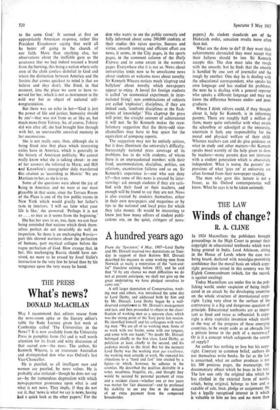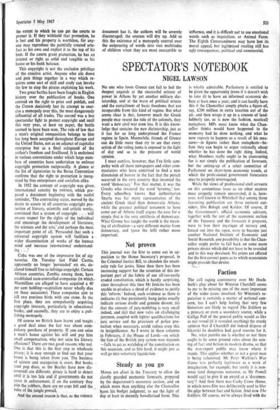Winds of change .
THE LAW R. A. CLINE
In 1924 Macmillans the publishers brought proceedings in the High Court to protect their copyright in educational textbooks which were being printed in India. Lord Atkinson, sitting in the House of Lords where the case was being heard, declared with nostalgia-provoking confidence that the moral basis on which copy- right protection rested in this country was the Eighth Commandment (which, for the record, is against stealing).
Today Macmillans are under fire in the pub- lishing world, under suspicion of being impli- cated in an attack by the developing countries on the whole structure of international copy- right. Lying very close to the surface of the controversy is a big and dangerous question of principle. Educational textbooks are as impor- tant as food and twice as influential. Is copy- right a dirty capitalist invention which stands in the way of the progress of these emerging countries, to be swept aside as an obstacle like a private house in the path of a motorway? Or is it a concept which safeguards the source of supply?
An author has nothing to lose but his copy- right. Contrary to common belief, authors do not themselves write books. So far as the law is concerned, what an author produces is not his 300 precious pages. the manuscript, the documentary object which he loses in his taxi. The law sees only the original idea which he has clothed in the external form of words, which, being original, belongs to him and is capable of sale, loan, pledge or assignment. He has a legally recognised interest in it which is valuable to him no less and no more than
the extent to which he can get the courts to protect it. If they withhold that protection, he is lost and his property is worthless, for any- one may reproduce the painfully created arte- fact as his own and exploit it to the top of his bent If the courts grant protection, he has an interest or right as solid and tangible as his house or his bank balance.
This copyright is not the exclusive privilege of the creative artist Anyone who sits down and puts things together in a way which re- quires some sort of skill and study can invoke the law to stop the pirates exploiting his work. Two great battles have been fought in English history over the publication of books. One centred on the right to print and publish, and
the Crown decisively lost its attempt to exer- cise a monopoly over this, the most dangerously
influential of all trades. The second" was a less spectacular fight to protect copyright and until this very year, at least on paper, the battle seemed to have been won. The rule of law that a man's original composition belongs to him has long been accepted throughout Europe and the United States, not as an adjunct of capitalist enterprise but as a final safeguard of the author's freedom and livelihood. It is enshrined in various conventions under which large num- bers of countries have undertaken to enforce copyright protection reciprocally. A glance at the list of signatories to the Berne Convention confirms that the right to protection is recog- nised by free enterprisers and socialists alike.
In 1952 the concept of copyright was given.. international sanctity by UNESCO, which pre- pared a document beginning with the useful reminder, 'The contracting states, moved by the desire to assure in all countries copyright pro- tection of literary, scientific and artistic works, convinced that a system of copyright . . . will ensure respect for the rights of the individual and encourage the development of literature, the sciences and the arts,' and perhaps the most important point of all, 'Persuaded that such a universal copyright system will facilitate a • wider dissemination of works of the human mind and increase international understand- ing . .
Cuba was one of the impressive list of sig- natories. On Tuesday last Fidel Castro, apparently no longer 'persuaded' etc etc, de- clared himself free to infringe copyright. Certain African countries, Zambia among them, have established state-controlled companies (in which,- Mactnillans are alleged to have acquired a 40 per cent holding—capitalism never wholly dies on these occasions). These companies aim to kill two precious birds with one stone. In the first place, they are compulsorily acquiring copyright interests, particularly in educational books; and secondly, they are to enjoy a pub- lishing monopoly.
Of course we British have learnt and taught a good deal since the last war about com- pulsory purchase of property. If you can seize a man's house against his will and pay him small compensation, why not seize his literary effusions? There are two good reasons why not. One is that this is the first step to wholesale piracy; it is easy enough to find out that your house is being taken from you. The business of seizure and occupation is overt. But books . (and pop discs, as the Beatles have now dis- covered) are different; piracy is hard to detect until it is too late and if governments do not assist in enforcement, if on the contrary they Join the robbers, there are no cops left and the . rules of the jungle prevail.
And the second reason is that, as the Implsco
document has it, the authors will be severely discouraged; the sources will dry up. Add to this the existence of a monopoly control over the outpouring of words into vast multitudes of children when they are most susceptible to influence, and it is difficult not to use emotional words such as inquisition, or Animal Farm. The Eighth Commandment may have lost its moral appeal, but legitiptised stealing still has ugly consequences, political and commercial.



































 Previous page
Previous page